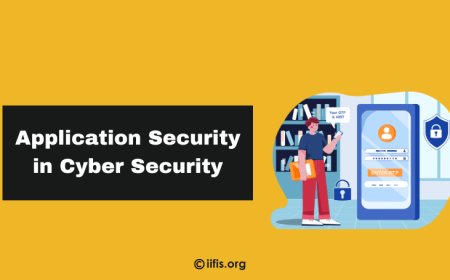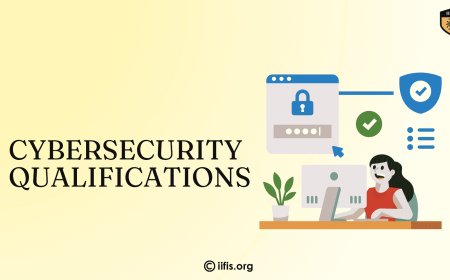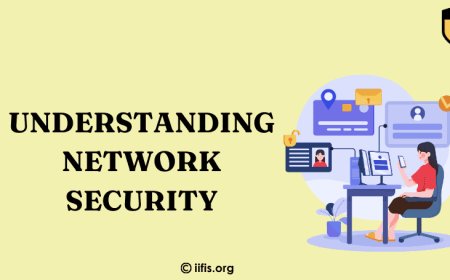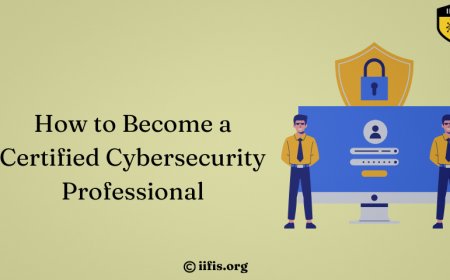Certified Cybersecurity Professionals: A Guide for Aspiring Learners
Discover the path to a cybersecurity career! Learn about certifications, skills, and strategies to protect digital systems and thrive in this in-demand field.
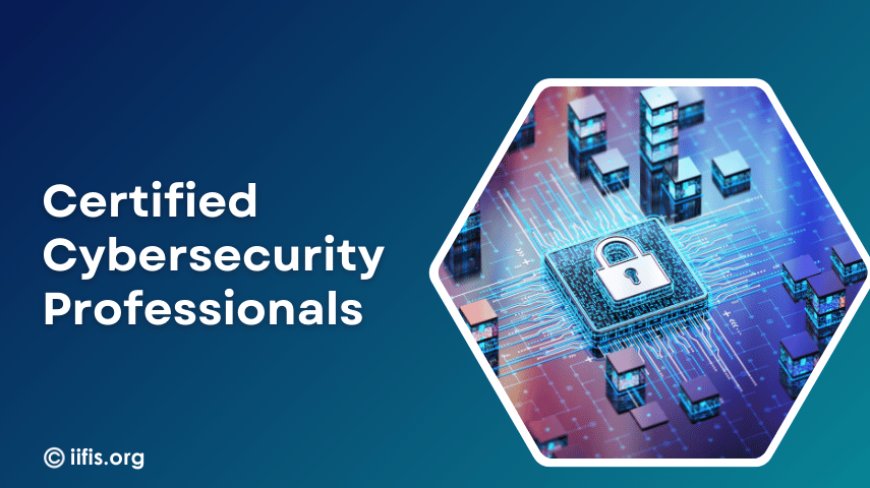
Cybersecurity professionals are the frontline defenders in the battle against cyber threats, safeguarding not just individual systems but entire organizational networks and critical infrastructure. Their expertise extends to identifying vulnerabilities, implementing robust security protocols, monitoring suspicious activities, and responding swiftly to incidents to minimize damage. With the increasing sophistication of cyberattacks, including ransomware, phishing, and advanced persistent threats, the demand for skilled cybersecurity experts has surged across industries such as healthcare, finance, government, and technology. Additionally, certifications like CISSP, CEH, and CompTIA Security+ serve as benchmarks of competence, equipping professionals with the tools and knowledge to stay ahead of evolving cyber threats and ensure the integrity, confidentiality, and availability of sensitive information.
Who Are Cybersecurity Professionals?
Imagine a house with valuable items inside. A cybersecurity professional is like a security guard and the person who installs locks, cameras, and alarms to keep everything safe. They ensure that digital systems, like websites and networks, are protected from people who try to break in and steal or damage information.
Some tasks cybersecurity professionals handle include:
-
Watching over systems to detect unusual activity.
-
Fixing weak spots in software and networks.
-
Quickly responding when there’s a cyberattack.
Why Get Certified?
In cybersecurity, having the right skills is essential to succeed in protecting digital assets and combating cyber threats. While certifications can validate expertise, building practical skills through real-world experience, self-study, and projects is equally important. Employers often value hands-on knowledge, such as understanding network protocols, coding for automation, and familiarity with tools like firewalls, intrusion detection systems, and vulnerability scanners. Engaging in activities like participating in capture-the-flag (CTF) competitions, contributing to open-source security projects, or gaining experience through internships can showcase your capabilities effectively. Continuous learning is also vital, as cybersecurity evolves rapidly; staying updated on the latest threats and defence techniques through online courses, forums, and research can demonstrate your commitment to the field. Ultimately, a combination of strong foundational knowledge, problem-solving skills, and a proactive attitude can be as impactful as formal credentials in building a successful career in cybersecurity.
Top Cybersecurity Certifications to Consider
The Information Security Foundation certification is designed for beginners, offering a strong introduction to the fundamentals of information security. Participants gain knowledge about basic security policies, risk management, and an overview of cybersecurity tools, making it ideal for those starting their cybersecurity journey.
The Certified Information Security Professional Level 1 is aimed at professionals with a foundational knowledge of cybersecurity. It focuses on advanced security policies, network security, encryption techniques, and incident handling, providing the skills necessary to tackle professional-level challenges.
The AI Cyber Security Associate certification explores the integration of artificial intelligence into cybersecurity practices. It focuses on AI-driven threat detection, automated incident response, and leveraging machine learning to improve security measures, making it a valuable credential for those at the forefront of technology-driven security solutions.
The Certified Penetration Tester certification is for professionals specializing in ethical hacking and vulnerability testing. It emphasizes techniques for identifying and exploiting vulnerabilities, conducting penetration tests, and recommending remediation strategies to secure systems effectively.
For those with intermediate experience, the Certified Information Security Professional Level 2 delves into threat assessment, penetration testing, advanced cryptographic methods, and system security architecture. This certification equips professionals to manage and secure complex systems effectively.
The Certified Information Security Analyst certification focuses on developing expertise in security analytics, threat intelligence, vulnerability assessment, and forensic analysis. It is tailored for professionals specializing in analyzing and mitigating cybersecurity threats.
Finally, the Certified Information Security Expert certification is for experienced cybersecurity professionals aspiring to leadership roles. It covers enterprise security management, advanced threat detection, incident management, and strategic security policy development, positioning individuals as experts in the field.
Skills You’ll Need
Cybersecurity is a combination of technical and personal skills.
-
Problem-Solving: Cybersecurity often involves figuring out how to fix unexpected issues.
-
Basic Programming Knowledge: Knowing a bit about coding languages like Python or Java can be very helpful.
-
Understanding Networks: Learning how computers and systems connect helps you identify security risks.
-
Communication: Explaining technical details in simple terms is crucial when working with non-technical people.
These skills are the building blocks for success in cybersecurity.
How to Become a Certified Cybersecurity Professional
1. Learn the Basics
Start with foundational knowledge of computers, operating systems, and networks. Use free online resources like tutorials and introductory courses to get started.
2. Practice Hands-On Skills
Develop practical expertise using platforms like TryHackMe or Hack The Box. These provide real-world scenarios to solve and build your problem-solving skills.
3. Choose a Certification
Select a certification that matches your career goals, such as CompTIA Security+ for beginners or CEH for ethical hacking.
4. Study and Prepare
Use study guides, video tutorials, and practice exams to strengthen your understanding and build confidence for the certification exam.
5. Take the Exam
Once prepared, register for the exam and earn your certification, demonstrating your skills and knowledge to potential employers.
What Jobs Can You Get with a Certification?
Cybersecurity certifications open up many career paths. Here are some roles you can pursue:
-
Security Analyst: Watches over systems to spot and stop threats.
-
Penetration Tester: Finds and fixes weaknesses in systems by simulating cyberattacks.
-
Network Security Engineer: Builds and maintains secure network systems.
-
Incident Responder: Acts quickly to fix problems when there’s a security breach.
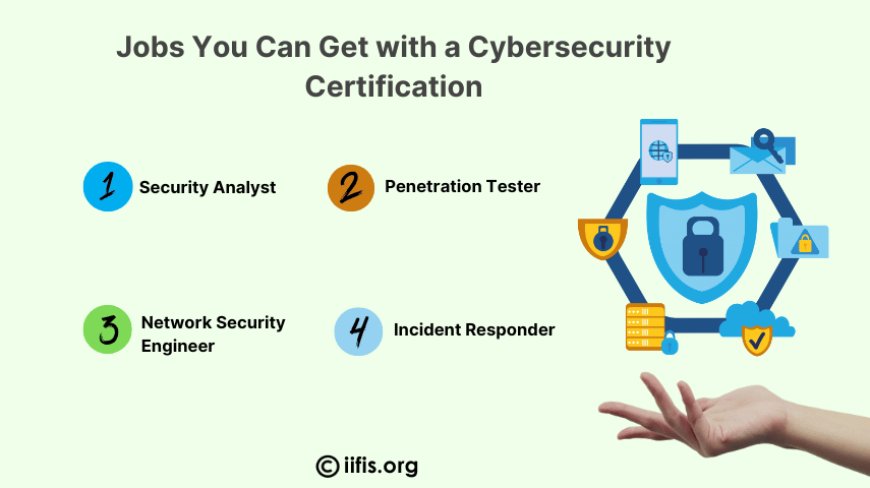
Cybersecurity professionals are in demand in industries like healthcare, finance, and government, making it a stable career choice.
Common Challenges in Cybersecurity
-
Evolving Threat Landscape
Cyber threats like ransomware, phishing, and zero-day vulnerabilities are constantly evolving, making it challenging to stay ahead. -
Shortage of Skilled Professionals
There is a global talent gap in cybersecurity, leading to overburdened teams and unaddressed security risks. -
Complexity of IT Environments
Modern IT environments often include on-premises, cloud, and hybrid setups, increasing the difficulty of maintaining consistent security. -
Insider Threats
Employees, whether through negligence or malicious intent, can pose significant risks to an organization’s security. -
Advanced Persistent Threats (APTs)
Sophisticated and well-funded attackers, often state-sponsored, can infiltrate systems and remain undetected for extended periods. -
Compliance and Regulatory Pressure
Organizations must navigate a complex web of cybersecurity laws and standards, such as GDPR, HIPAA, and PCI-DSS, which require constant monitoring and adjustments. -
Lack of Awareness and Training
Employees without proper cybersecurity training can fall prey to social engineering attacks, compromising organizational security. -
Budget Constraints
Many organizations struggle to allocate sufficient budgets for robust cybersecurity solutions, tools, and training. -
Data Privacy Concerns
Balancing security measures with the need to protect user privacy can be a challenging and sensitive task. -
Third-Party Risks
Organizations often rely on third-party vendors, increasing exposure to supply chain attacks and vulnerabilities outside their control.
Resources to Help You Get Started
Here are some great resources to begin your cybersecurity journey:
-
Websites:
-
Cybrary (offers free courses and tutorials).
-
OWASP (learn about web security).
-
Books:
-
“Cybersecurity for Beginners” by Raef Meeuwisse.
-
“Hacking: The Art of Exploitation” by Jon Erickson.
-
Practice Labs:
-
TryHackMe
-
Hack The Box
These resources are beginner-friendly and provide a solid foundation.
How to Study for Certification Exams
Preparing for a cybersecurity exam takes time and effort. Here are some tips:
-
Use Official Study Guides: Most certifications have official materials that cover everything you need to know.
-
Take Practice Tests: These help you get familiar with the exam format and types of questions.
-
Join Online Communities: Forums and groups are great places to ask questions and share tips.
-
Hands-On Practice: Theoretical knowledge is good, but practical experience is what helps in exams and real-life situations.
Continuing Your Learning Journey
Earning a certification is just the beginning. The cybersecurity field is always evolving, so staying updated is essential. Professionals keep learning by:
-
Following blogs and news sites about cybersecurity.
-
Attending workshops and conferences.
-
Taking advanced courses and earning new certifications.
Becoming a certified cybersecurity professional is a journey that starts with curiosity and dedication. It’s a field where you can solve real problems, protect valuable information, and build a rewarding career. With the right certifications, skills, and mindset, you can make a difference in keeping the digital world safe. So, if you’re thinking about a career in cybersecurity, take the first step. Start learning, practice often, and don’t be afraid to ask questions. The world of cybersecurity needs more passionate and skilled professionals like you!



